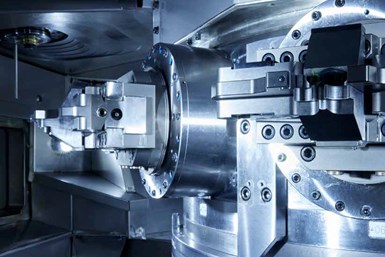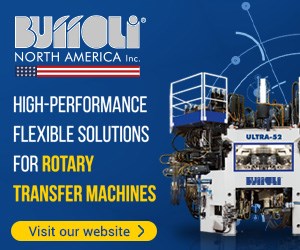Rotary Transfer Technology Becoming More Flexible
This rotary transfer machine platform, which enables shops to reconfigure equipment to change over to new jobs as needed, is said to be effective for batch sizes of only 50 parts.

For this rotary transfer machine platform, a zero-point clamping system is said to ensure positioning repeatability for exchanging machining units at any given station. Photo Credit: Mikron
Manufacturers of traditional high-volume turning and milling equipment continue to incorporate flexibility into their machine designs to enable shops to effectively run jobs in smaller batch sizes.
One example is the MultiX rotary transfer platform from Mikron featuring configurable (and then reconfigurable) machines that the company says can accommodate production runs of 50 to 5 million parts.
The concept enables near à la carte configuration, depending on a shop’s current and future needs. For example, users select machine base; transfer tables with 4 to 24 stations; exchangeable machining units (three machining units can operate simultaneously at each station); workpiece clamping and positioning systems, including those for B-C axes movement; spindles (electro spindles; double spindles; U-axis spindles; and so on), automatic toolchanger-style (spindle with four tools, disk with 12 tools or upper and lower disk each with 12 tools); and loading/unloading system (such as standard three-axis pick-and-place and six-axis robot).
Three machining units can operate simultaneously at each station.
The machining units differ in size, number of axes, strokes and size of compatible spindles. They can be exchanged within the platform and reused in different configurations. A zero-point clamping system is said to ensure positioning repeatability for machining units at any given station. According to the company, not only does this offer process flexibility but scalability to add or replace machining functionality as needed.
The operating software and human-machine interface (HMI) is said to be intuitive as well as adaptable to new machine configurations. The software also offers capabilities such as production scheduling, component temperature monitoring and statistical process control (SPC) monitoring.
Related Content
-
Precision Machining Technology Review: August 2024
Production Machining’s August 2024 technology showcase includes some of the latest technology from SW North America, Tsugami, Siemens, Select Manufacturing Technologies, Hurco and ECI Software Solutions — all on display at IMTS 2024.
-
Moen’s Flowing Success with Rotary Transfer Technology
The popular faucet manufacturer has adopted new CNC rotary transfer equipment to produce valves for its new generation of Widespread faucets.
-
PMTS 2023 Product Preview: High-Volume Turning
Learn about some of the latest high-volume turning solutions that will be on display at PMTS 2023.










.jpg;maxWidth=300;quality=90)





